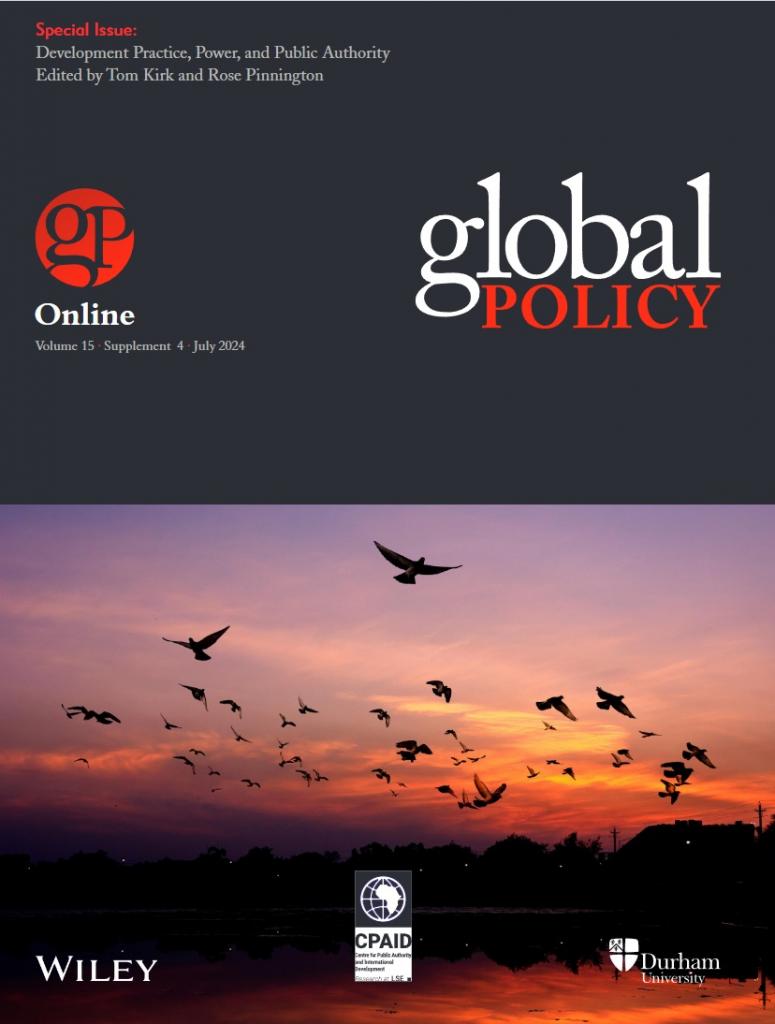What Can We Learn About Legitimacy from a New Special Issue on Public Authority

Tom Kirk and Rose Pinnington argue that notions of how legitimacy is created must make room for the role of social norms and networks to better understand the wider implications for humanitarian and development interventions.
The public authorities lens emerged from literature exploring how legitimate authority is claimed and people are governed in the early 2000s (Lund, 2006). Many of its foundational authors produced research on so-called ‘fragile’ and conflict-affected places with the intention of moving past state centric frameworks and theories. They showed how a variety of actors, from local civil society organisations and customary leaders to patronage networks and armed groups, claim positions of authority and govern by combining the provision of vital public goods with appeals to popular social norms (Hoffman and Kirk, 2013; Kirk and Allen, 2021).
Central to this literature was a notion of legitimate governance that suggested a modicum of voluntary compliance is necessary to distinguish public authority from pure coercion. Nonetheless, those using a public authority lens remained alive to how such processes can include and exclude particular ideas, identities and ideologies, and, in doing so, create insider and outsider groups. For many, the aim has been to show how this can contribute to or frustrate a variety of developmental goals, often creating opportunities for some and leading to the suppression of others, including through violence and oppression.
 Parallel research into conflict-affected places, pandemic responses and falling trust in formal institutions has led scholars to question the primacy of rational actor and procedural justice models of legitimacy (Weingard, 2022; Schomerus, 2023; Tyler, 2023; Macdonald et. al 2022). It suggests that legitimacy does not always stem from people’s notions of the costs and benefits of following rules, or their belief in their fairness. Instead, room must be made for social and moral norms and ideologies. They can be particularly important where public authorities do not have the resources to enforce rules or ensure the fairness of procedures.
Parallel research into conflict-affected places, pandemic responses and falling trust in formal institutions has led scholars to question the primacy of rational actor and procedural justice models of legitimacy (Weingard, 2022; Schomerus, 2023; Tyler, 2023; Macdonald et. al 2022). It suggests that legitimacy does not always stem from people’s notions of the costs and benefits of following rules, or their belief in their fairness. Instead, room must be made for social and moral norms and ideologies. They can be particularly important where public authorities do not have the resources to enforce rules or ensure the fairness of procedures.
But what can more recent research using a public authority lens add to these notions of legitimacy?
To answer, we turn to research in a recent open access special issue of Global Policy we had the pleasure of guest editing. It arose from papers given at the 2021 Development Studies Association conference entitled ‘Unsettling Development’. And it consists of studies across Europe, Africa, the Middle East and South Asia. They focus on places and situations often labelled as in crisis or understood to be subject to multiple overlapping crises (Allen & Parker, 2023; Büscher et al., 2024; Storer & Torre, 2023). However, they also examine how public authority dynamics affect everyday governance in outwardly more stable contexts (Joshi et al., 2024; te Lintelo & Liptrot, 2023; Kirk, 2023; Pinnington, 2023). These dynamics are also systemised within a conceptual paper that outlines the different tactics skilful public authorities use to accrue legitimacy (Ferguson, 2022).
Many of the papers derive their findings from long periods of ethnographic immersion within the societies under study, from familiarity with or participation in ongoing development programmes and humanitarian responses, and from close collaborations between researchers and those being researched. This enables them to show how development interventions often rely on locally embedded or connected public authorities, sometimes termed intermediaries, to get things done. They are engaged to navigate and influence change processes by drawing on their local relationships and networks, and they are asked to be the bridges between local politics and outsiders.
Nonetheless, the authority of such intermediaries is revealed to be often dependent on gaining external legitimacy. For example, in Pakistan, the studied intermediaries gained external legitimacy as ‘experts’ by translating messy local political realities into technical donor discourses (Kirk, 2023). This is also seen in Uganda, where the key intermediary's positonality as an ‘independent’ expert gave an institutional reform programme external legitimacy in a local context in which the dominant politics threatened pro-poor outcomes (Pinnington, 2023). In a similar vein, other research in the country demonstrates how international public health practitioners played a legitimising role in recognising and praising public authorities’ militarised responses to the COVID-19 epidemic (Allen and Parker, 2023).
In these cases, the studied public authorities are not simply conforming to the expectations and social norms of those they govern; they are seeking and gaining legitimacy from actors and institutions normally thought to be external to their societies. They are shown to do this by strategically occupying positions within networks that connect them to national and international powerholders. Indeed, the issue’s papers highlight the importance of understanding public authority as both a property held by individuals and institutions, and as cultivated and channelled through networks.
For example, networks are central to the analysis of a paper in the issue that uses ‘governance diaries’ to show how public authorities in Mozambique, Myanmar and Pakistan gain legitimacy by leveraging their extra-local connections to bring a measure of order and public goods to those residing in challenging places (Joshi et al. 2024). They are also present in research that documents how sub-national local public authorities build and mobilise ‘power networks’ to disrupt donor supported decentralisation efforts in the Democratic Republic of the Congo (Büscher et al., 2024). And they are found in the Italian Alpine region where ‘solidarity networks’ provide vital assistance to migrants journeying across perilous borders during the COVID-19 pandemic, at the same time as they undermine the state’s authority (Storer & Torre, 2023).
Viewed together, the issue’s papers suggest that to accrue legitimacy successfully, public authorities must often subscribe to, co-opt or subvert the norms and practices of those outside of their immediate social milieus, whilst maintaining positions within multi scalar networks through which legitimacy can be passed. For theorists and researchers, the issue’s papers suggest that ethnographic, place-based research should be complimented with nuanced accounts of multi-scalar, transnational networks and actors’ positions within them.
The implications of this way of understanding legitimacy for humanitarian and development practitioners are explored further in the special issue. They point fundamentally to the role of donors and their partners as public authorities themselves, challenging, seeking or reproducing the legitimacy to govern in local contexts. While this role is widely recognised, it rarely makes its way into official narratives and depictions of success and failure, reducing opportunities for a more faithful and open public discourse on the politics of development and humanitarian action.
Tom Kirk is a researcher and consultant based at LSE. His research interests include the provision of security and justice in conflict-affected regions, social accountability, civil society, local governance and public authority.
Rose Pinnington is a research associate at King's College London, Department of Political Economy. Her research focuses on the politics of development and humanitarian action. She is interested in donor efforts to ‘localise’ their practice, address power imbalances and respond to local political realities in operational contexts.


